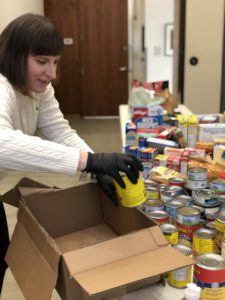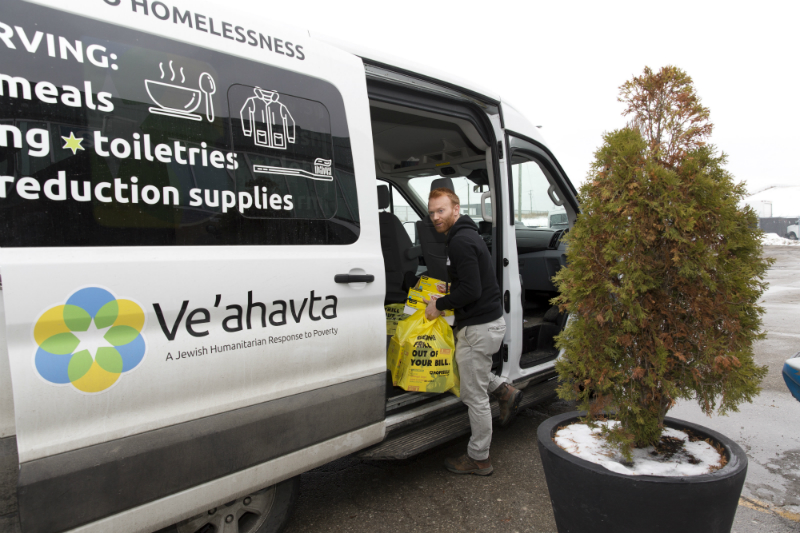With horror stories about COVID-19 spreading as quickly as the virus itself, Canadians are struggling to remain calm. But one Canadian is providing concrete ways to “show up” for those who may need an emotional boost.
“Many people feel asphyxiated by the unknowns. But there are pinpricks of light,” said Kim Smiley, founder and CEO of the Empathy Effect. Empowering some 75 countries through social media, the Empathy Effect shines a light on the beauty and interconnection that crises or pandemics often catalyze.
“We are inspiring people to practise the #empathypledge, a promise to practise one act of empathy a day,” explains Smiley. “We’re trying to quell the fear through focusing on the beauty that still surrounds us.”
UJA Federation of Greater Toronto, the hub of more than 100 organizations in the community, has launched a campaign to mobilize community members to get involved and support the most vulnerable people, who may not be able to shop for much-needed stores of food and cleaning supplies.
“We have set up a donation dropoff system at (the) Lipa Green (Centre), asking community members who want to donate to drop off either a kit that they have assembled themselves or just a box of supplies that they can spare,” said Steve McDonald, UJA’s vice-president of communications and marketing.

“We are working with our Jewish social service agencies to ensure that we have a safe and effective delivery mechanism to get these kits out to community members who are going to be confined to their homes. Volunteers will be phoning vulnerable seniors, checking in to see how they are doing and we are looking to set up a hotline that people can call for assistance.”
Every year, UJA raises funds for its Global Seder program, helping vulnerable Jews, locally and globally, to celebrate Passover in dignity. But this year is unlike any other year, due to the coronavirus. However, a donor has stepped in to provide additional support.
“We have received a phenomenal gift from the Krawczyk family. They have generously offered to match, dollar for dollar, donations up to $100,000, dedicated to help the most vulnerable in our community to help with the pandemic,” said McDonald.
But the fallout from COVID-19 is more than just financial, as people, following public health authorities’ recommendations, become more isolated.
“Anxiety thrives and grows when we have free time,” said Leanne Matlow, a cognitive behavioural counsellor and founder of Mental Health Empowerment Day. “Parents should continue to get kids to bed and wake them up at their normal time.
“We really have to be cognizant of social distancing – you can’t have a music group over at your house, it’s actually irresponsible. You can teach your kids about charity. Go through your house and find things you don’t need anymore and create a donation bag. It’s really about finding the good in an uncertain situation. We can’t forget that there is incidental learning – silly things, like taking things out of your cupboard and alphabetizing them, or baking and measuring and doing a craft or playing board games. It could be a scavenger hunt – go find something in the house that starts with an L.”
Matlow encourages people to reach out to one another.
“It’s a time to build community. Even though we are isolated, we can still help each other. FaceTime and Skype with friends and grandparents to stay connected.”
Matlow added that there is still beauty in the world to appreciate.
“There are still trees,” she said. “You hear birds singing and you can feel the warmth of the sunshine. Seize that moment.”
Ve’ahavta, the humanitarian social services agency that provides intervention programs for people who have been affected by homelessness, is calling out to the community.
“We are working with a very vulnerable population who have multiple health issues,” said executive director Cari Kozierok. “We are asking people to donate gift cards to Tim Hortons so folks can buy something hot …. We are very fortunate we can wash (our hands) with soap and water any time we want, but the people affected by homelessness don’t have bathrooms and soap to wash up. Hand sanitizers, especially the really small bottles, are things we could be distributing to help them stay safe. We are also asking people to go on our Amazon wish list.”
Danielle Morris, founder of Hungry North of the GTA, a Facebook food-sharing group for Ontarians in North York, Thornhill, Richmond Hill, Aurora and Barrie, is helping those in need who don’t have food or are locked down and can’t get out.
“There’s a tenet in Judaism that it’s a sin to waste food,” said Morris. The premise is simple: If you have extra food, you post it. If you are in need, you post it and it gets delivered.”
To learn how you can help, visit jewishtoronto.com/help-us-help-our-most-vulnerable.
